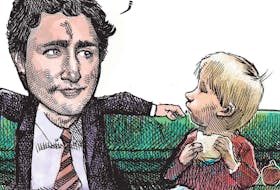It’s clear that leadership style takes its cue from whatever mood is prevalent in the governed population. Swings between a kinder, gentler policy style, to a tough, hardline approach, very much depend on the temper of the times.
When the electorate is feeling secure and content with life it’s prepared to ease up on the reins a little and allow the leader of the time to make grand promises of wrongs to be righted, and aspirations to be fulfilled.
This can only go on for so long however. When the winds of change blow cold and menacing, as they are now, it is usually time to rally around a narrowly focussed autocratic leader who gives no quarter and makes few concessions.
Events leading up to the Second World War clearly illustrate this phenomenon. While Adolf Hitler was invading Poland and France in 1940, Britons had lost faith in their prime minister Neville Chamberlain who had promised “Peace for our time” having naively signed the Munich Agreement with Hitler, that Hitler soon violated, causing Chamberlain to resign in shame.
The nation was looking for a strong leader who would command the support of all three major parties, and King George VI asked Churchill to be prime minister. No one assumed he would remain prime minister after the war to come. As a cigar-chomping uncompromising British “bulldog” he was simply the right man for the job at the right time.
At the end of the war in 1945 the wartime coalition was disbanded, and an election took place in which, to no surprise, Churchill was defeated, and he handed over to a progressive Labour government led by Clement Attlee, who promised a brighter post-war picture in their campaign.
The National Health Service (NHS) was quickly established: a publicly funded healthcare system, which offered treatment free of charge for all, including dental work and sight aids.
A large house-building program was carried out with the intention of providing millions of people with habitable homes. Most houses constructed were council-owned properties and subsidies kept down council rents. I grew up in one of these homes in Wales, my parents not being that well off, and it met our needs nicely.
Prime Minister Attlee also put in place a system of social security, in which working folk were eligible for a wide range of benefits, including pensions, sickness, unemployment and funeral benefits.
State scholarships to universities were increased, with the government supplementing scholarships awards to cover fees plus maintenance. I later benefitted from this policy and would certainly not have been able to receive such an education relying on my family’s limited resources.
However, by 1951, the Attlee government was exhausted, and almost penniless. There were rumours of an austerity budget in the works and the population was looking for a more robust leadership.
Attlee chose to call a snap election in October 1951, but he lost to the Conservative Party led by Churchill for a short second stint. Labour and Conservative governments then alternated until 1979 when the Conservative “Iron Lady” Maggie Thatcher took over with an uncompromising leadership style which seemed to fit the times.
Thatcher set about "destroying the power of the trade unions for almost a generation" according to the BBC. The miners' strike of 1984–85 was the biggest confrontation between the unions and the government under Thatcher. The closure of 150 state-owned coal mines, resulted in the loss of tens of thousands of jobs and had the effect of devastating entire communities.
Pursuing her policy of privatization, more than 1,000,000 council homes in the UK had been sold off by 1987, including our family’s modest abode which we had long ago vacated, and I had emigrated to Canada. I checked it out on Google Maps recently…it is now unrecognizable with a garish paint job and a vehicle parked outside the house where flowers used to grow. When originally built in the 1940s I guess it was not envisaged that tenants could afford to own a vehicle!
Fast forward to the troubled times we live in today, facing a federal election with the three main contestants not being seen by many to have the “right stuff” to navigate us through; and the “Sunny Ways” philosophy proving to be decidedly out of step with the challenges we now face.
It’s very likely that we will elect a minority Conservative government in October…if that’s the case I believe that the outcome would be much more promising if the current Conservative deputy leader Lisa Raitt were to be playing a central role in the affairs of the country.
With experience in the Harper government, holding ministerial posts in Labour, Transport and Natural Resources; possessing a law degree from Osgoode Law School, and a master's degree in chemistry, specializing in environmental toxins; she is clearly a very smart and experienced individual.
Most impressive to me was her strong performance at the recent SNC Lavalin parliamentary hearings where I felt she was the class act.
Alan Walter is a retired professional engineer living in Oxford. He was born in Wales and worked in Halifax. He spends much of his time in Oxford, where he operates a small farm. He can be reached at [email protected].

![['Did You Know That with Alan Walter']](https://saltwire.imgix.net/did-you-know-that-with-alan-walter-3009037.jpg?cs=srgb&fit=crop&h=568&w=847&dpr=1&auto=compress%2Cenhance%2Cformat)







